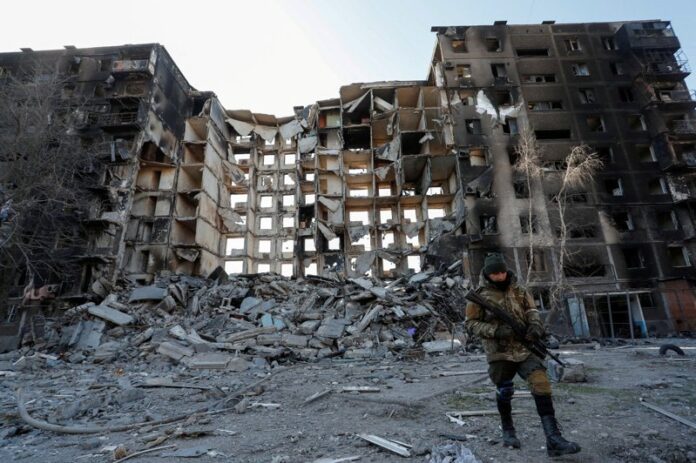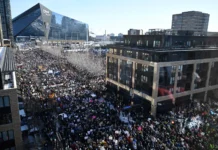Andy Moxley, Socialist Alternative (ISA in the United States)
ISA condemns the bloody Russian invasion of Ukraine, which has already displaced millions and killed or wounded thousands, and demands the withdrawal of Russian troops immediately.
This war is part of a wider conflict which was created by both Russian and Western imperialism (NATO) only for the profit, power and prestige of their respective imperialist blocs. The intense war propaganda by voices of the capitalist press in the U.S., UK, the EU, Russia must be resisted. Socialists stand for neither imperialist ‘side’ in this war, standing with the Ukranian people and their right to self-determination and with the working class across borders who have no interests but in stopping this systematized murder of fellow working people.
This article deals with a specific question opening up in debate in many countries whose governments support the Western bloc in the war. For a more general analysis and program on the war, read these important recent publications from ISA.
As the madness of the war in Ukraine continues to create enormous bloodshed and a refugee crisis the likes of which have not been seen in Europe since the Second World War, millions of workers and young people around the world are seeking answers to end the chaos and violence. Amid this growing anxiety and confusion about the situation, both Moscow and Western powers are mounting massive propaganda campaigns.
With global revulsion at Putin’s invasion growing, a discussion about the possibility of more direct intervention by NATO militarily, to stop the Russian invasion, has been posed.
The war has given Western imperialism a lucrative avenue to build support by constructing an overall narrative of a Western bloc that defends ‘democratic values’ and ‘national sovereignty’ versus the oppressive authoritarianism of Russia and China.
As we’ve explained elsewhere, Putin’s new and horrendous war is part of a wider inter imperialist conflict, the new cold war between U.S. imperialism and Chinese imperialism. Ukraine has been an important forum for imperialist conflict over the past years. In particular, the extension of the U.S.-led imperialist military alliance NATO into central and eastern Europe since the collapse of Stalinism has aided the development of the current war. So has the change in tact adopted by U.S. President Joe Biden’s administration towards the Putin regime since taking office in January 2021.
The success of the West’s “democracy” narrative, which continues to fill the front pages of news sources throughout North America and Europe in particular, paired with the genuine horror with the war has meant the mood for direct Western intervention has grown. This has been particularly the case in the support for further economic sanctions, polling at 69% support in the U.S., 82% support in Japan and 78% in the UK at the time of writing, all representing a seismic shift in favor.
With the horrors of the war continuing, a call for more direct military intervention from NATO can gain resonance. While broad support for NATO ‘boots on the ground’ in Ukraine remains relatively low, a recent poll indicated NATO implementation of a ‘No Fly Zone’ would enjoy up to 74% support in the U.S.. And though a shift from the policy of the massive amount of military aid being delivered from the majority of NATO and EU countries towards mobilization of their own forces into the country seems unlikely at the moment for a variety of reasons, some significant figures in Western political and military establishments have come out in support. Since the beginning of the war, cabinet members of the ruling Conservative Party in the UK have put out contradictory statements and recently General Philip Breedlove (the former NATO supreme commander in Europe), Scottish First Minister Nicola Sturgeon and former U.S. National Security Advisor John Bolton have all expressed, at least implicitly, support for a No Fly Zone.
Western intervention would mean more bloodshed
Western imperialism has restrained itself thus far from military intervention. Its representatives, including Biden, are on record as ruling out engaging in direct military combat with Russia, openly declaring that this would mean “World War 3.” However, U.S. and NATO imperialism’s reluctance to engage in the short term is not down to fear of greater bloodshed among ordinary people but due to its own interests. From the perspective of U.S. imperialism, despite everything happening with Ukraine and Russia, China is its still main strategic rival. And China itself is also wary of getting directly involved for its own imperialist reasons.
However, events like the Russian bombing of a Ukrainian military base close to the Polish border on 13 March have heightened fears that a direct conflict could be provoked. On the same day, the Polish President stated that in the case of a Russian attack within Ukraine using chemical weapons, NATO would have to “think seriously” about intervening militarily.
The establishment of a NATO No Fly Zone would be a direct move towards a broader and bloodier war directly involving all NATO countries: it means direct conflict between NATO and Russia. This type of war could not only surpass the horrors of all previous wars but could pose a threat to humanity itself as it will be the first direct conflict between imperialist powers in the age of nuclear warfare. Whether or not it was just a ‘show of force’ that Putin put the Russian Nuclear Defense Forces on high alert in the last few weeks, it represents a very real threat.
Even a limited (spoken of as “tactical”) nuclear strike by either side could be on the scale of U.S. imperialism’s bombing of Hiroshima and Nagasaki in World War II which killed over 213,000 people either instantanously from the strikes or within 5 months due to acute radiation poisoning. And while the rich and powerful would be able to hide in their bunkers, it would be regular people that would bear the brunt of the horror. Not only that but even a ‘limited’ initial strike would likely provoke a retaliatory response.
Socialists must stand steadfastly against the war in Ukraine, and also against this war spilling over into an even more catastrophic and reactionary global bloodbath.
The bloody history of Western intervention
Beyond its immediate implications of drawing more workers and young people around the world directly into the bloodshed, socialists oppose all imperialist military intervention. History is littered with imperialist forces offering military aid to ‘assist’ struggles of oppressed peoples only to betray them for the preservation of their own interests. Far from being humanitarian in their intentions, history is full of massacres and terror bombings conducted by Western imperialism.
The history of the last two centuries is one in which Western imperialism played a decisive role in arming and supporting reactionary movements and regimes. This goes right back to their response to the 1917 Russian Revolution, the greatest event in human history in which the working class liberated itself from capitalist exploitation, which is important and illuminating.
In the wake of this earth-shattering event the former exploiters (tsarist officials, aristocrats, large capitalists, etc) and right-wing political forces who opposed the revolution came together to fight to restore capitalism, monarchism and oppress ethnic and national minorities whose rights had been recognized by the new government. These forces unleashed an ill-fated “Civil War” and became known as the ‘White Army.’
Fearing the example of the Russian Revolution in providing inspiration to the working masses and poor in their own countries who had equally been devastated by the pointless slaughter of the First World War and were already beginning to take a revolutionary road, capitalist and imperialist powers from around the world including the United States, Britain, France and others sent 21 armies (roughly 200,000+ soldiers) to aid the counterrevolutionary forces.
Ultimately, the White Army disintegrated and Western forces withdrew having been defeated militarily, but also politically as the new workers’ government was able to appeal to workers across the world to take action to refuse to aid the counter-revolutionary movement. They struck, boycotted and refused to move arms to be used against the working class in Russia. But this temporary retreat by Western imperialism was not the end of the story as the decades-long original Cold War which followed would see continued bloody proxy clashes between the USSR and the U.S. until the collapse of Stalinism in the early 1990s. Throughout this period, the West armed everyone from right-wing death squads and bloody military coups in Latin America to Islamic fundamentalists in the Middle East. None of these interventions were to protect the people of these regions, just to advance their own interests for profit, power and prestige.
No Fly Zones in recent history
For a more recent history, we can fast forward almost a hundred years. The Arab Spring of 2010–11 brought forward mass and victorious popular revolutions toppling reactionary regimes across the Middle East and North Africa. Unfortunately, the absence of a clear working class-led political alternative meant that capitalism was maintained, the revolutions were not able to consolidate their positions. In Syria and Libya, this quickly led to the eruption of civil wars, as rival gangs of exploiters sought to fill the vacuum.
In Libya, the masses across tribal lines in Benghazi stood up in revolt and ran the repressive Muammar Gaddafi regime out of this and surrounding cities. Only a few weeks later NATO, which had previously very happily worked closely with Libyan dictator Gaddafi quickly established a ‘No Fly Zone’ in wake of the revolutionary developments. The term ‘No Fly Zone’ is intentionally misleading. It includes not just no planes being allowed over a certain area but the military neutralization of the ‘Zone’ including by attacking installations that are deemed as threats to military aircraft — an extremely wide and murky net to cast.
At the time many progressive-minded youth and workers would have looked at this as a positive development preventing Gaddafi’s forces, which were significantly better armed, from gaining military initiative against rebel anti-government forces. However, NATO had not done this out of commitment to the revolutionary struggle of the Libyan masses but to protect its own interests in the region. Despite continuing to be slowly bled by the costly military occupations of Iraq and Afghanistan, U.S. imperialism — through NATO — used the opportunity to insert itself in a limited way to prevent the spread of the revolutionary tide further, particularly into countries occupied by key allies of U.S. imperialism in the region such as Saudi Arabia.
In Libya, this resulted in a NATO bombing and airstrike campaign that killed not only many of the rebel forces they said they were there to support but also hundreds of civilians, wounding thousands more. As U.S. imperialism had no real interest in Libya itself, something admitted by several senior U.S. governmental officials at the time, once its main mission of heading off independent action by the Libyan masses was achieved by its intervention and Gaddafi’s death, it unceremoniously withdrew entirely. It succeeded in derailing the popular rebellion and left Libya in a fractured, divided state of sectarian war that continues to this day.
In Kurdistan, (the nation comprising parts of Turkey, Iran, Iraq and Syria) the fierce resistance of the Kurdish people against the seemingly unstoppable advance of the medieval violence of the jihadist Islamic State in 2014–2015 was celebrated by Left and progressive people across the world. This was not in the least because the most ferocious fighting came from the IS-besieged canton of Kobane in Western Kurdistan (aka Rojava). Rojava is the Syrian part of Kurdistan which has been self-governed under a system of ‘democratic autonomy’ by the Syrian branch (PYD) of the Kurdistan Workers Party (PKK) since it was deserted by the forces of Syrian dictator Bashir al-Assad in 2012.
While originally intending to abandon Kobane to IS, the U.S. government made an abrupt change in policy as the canton bravely continued to hold out against the onslaught they were receiving from the Islamic State. Seeing a chance to strike a blow against IS (which threatened U.S. imperialist interests in the region), restore some lost prestige and wanting to have leverage on the ground versus Russia and Turkey’s Erdogan, respectively, the U.S. intervened with another ‘No Fly Zone.’ This intervention included airstrikes on the IS, providing weapons and supplies to the Rojava military forces of the Peoples Defense Units (YPG). Ultimately IS was successfully defeated in the battle by the brave fighters of Rojava.
As it always does, the aid from imperialism came with significant strings attached. Not in the least in the attempt by the U.S. government to install a more ‘moderate’ political regime in Rojava. In the wake of the destruction wrought by the siege and the bombing, the Kurdish people were left to their own devices in trying to rebuild their homes, schools and other infrastructure.
But even more destructive was the fact that this was the beginning of a dangerous path of alliances with capitalist and imperialist powers for leadership of the different Kurdish political factions that have caused serious defeats for the Kurds. Again this undermined the struggle for self-determination for the Kurdish people by essentially becoming a vassal state for U.S. imperialism. And when that relationship became too costly and no longer necessary from the standpoint of the U.S., the Kurds were abandoned. This happened only a few years later in 2019 when U.S. imperialism once again suddenly withdrew all its forces without warning as Turkey invaded Rojava. This created a mass refugee population of over 300,000 seemingly overnight. In addition Afrin, one of the three cantons in Rojava, remains under Turkish occupation to this day.
What can end the war?
Socialists are not pacifists. But we understand the old maxim that ‘war is the continuation of politics by other means.’ The previous examples are only a few of many that show workers and the oppressed cannot place any trust in any form of imperialism as an ally in the fight for our survival. Those examples also illustrate another important lesson that flies in the face of the long list of politicians and media commentators (many of whom hail from the “Left”) who put forward illusions in the “pragmatism” of a military solution to the conflict based on imperialist intervention.
To be sure, socialists support the right of the Ukrainian masses to defend themselves including with arms. And as we’ve elaborated elsewhere, who controls the arms and how the working class is organized in defense are all important questions on that front. However, particularly when it comes to a militarily weaker force taking on a much bigger army, it will be the question of politics that is the most decisive weapon in the hands of workers and the oppressed.
We saw a glimmer of this in the early days of the invasion. Social media was abound with videos of Ukrainians talking to Russian soldiers, asking them why they were there and imploring them to return to Russia. They were not greeted by bullets but with Russian soldiers responding they did not know why they were there or even want to be in Ukraine. While the extent of this is unclear as the Western media used it for its own ends, it gives a small view of what could stop the war.
U.S. imperialism’s war in Vietnam during the 1960s and 70s would become its most humiliating defeat in history. Even with the Soviet Union supplying the Vietnamese army and resistance, the U.S. had a massive advantage in military resources. The war quickly became unpopular at home as it came to be seen as imperialism trying to assert its own agenda with the U.S. working class and poor being used as cannon fodder. This was in no small part based on political appeals from the Vietnamese people who were motivated not just by defending themselves but also their movement which fought against capitalist and imperialist exploitation, for land reform, women’s rights, and social reforms. Especially among Black and brown soldiers, a sense of solidarity with the Vietnamese grew as they identified their experience with their own racist and exploitative treatment by U.S. capitalism. A mass anti-war movement developed domestically and dissent spread among the armed forces as U.S. soldiers refused to fight or obey their commanders. This paralyzed the U.S. war machine and effectively ended the war.
The current war is already unpopular among many people in Russia, where there are rumors of dissent within the army itself. If the Ukrainian masses were armed and organized by democratic, independent working class self-defense committees based on a revolutionary struggle, a class appeal to the Russian working class declaring their common interests in struggling against war and the impoverishment and oppression characteristic of life under both Putin and Zelensky could be made. Such an appeal, calling on the Russian working class to stand in solidarity as workers and refuse to participate in the war could have an immeasurable effect.
It would not only give fuel to the antiwar movement but also give confidence to Russian soldiers to refuse to obey orders to continue with the war. Combined with an appeal to the workers of the world in all nations to take action to refuse to provide any material for the war effort, refusing to transport arms, etc. an international working class movement could stop the war in its tracks. It could also very quickly give an impetus to the revolutionary potential in mass movements, illustrating the independent interests and power of the working class across borders.
However, all this must be done on the basis of an independent working class standpoint. Intervention or deals with Western imperialism will only weaken the movement of the working class, undermine its independence and mean more broken promises from capitalists and imperialists. A revolutionary struggle against the war must first and foremost be an international working class political struggle against the warmongers themselves. Only on this basis can we end the war in Ukraine, but also future wars and the system of capitalism and imperialism that creates them at our expense.




